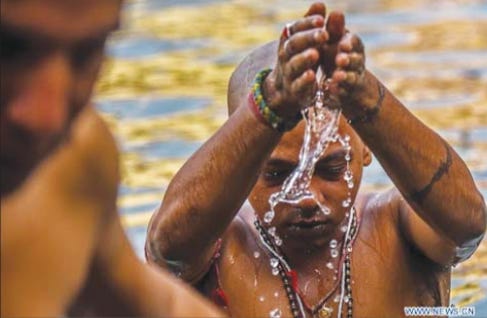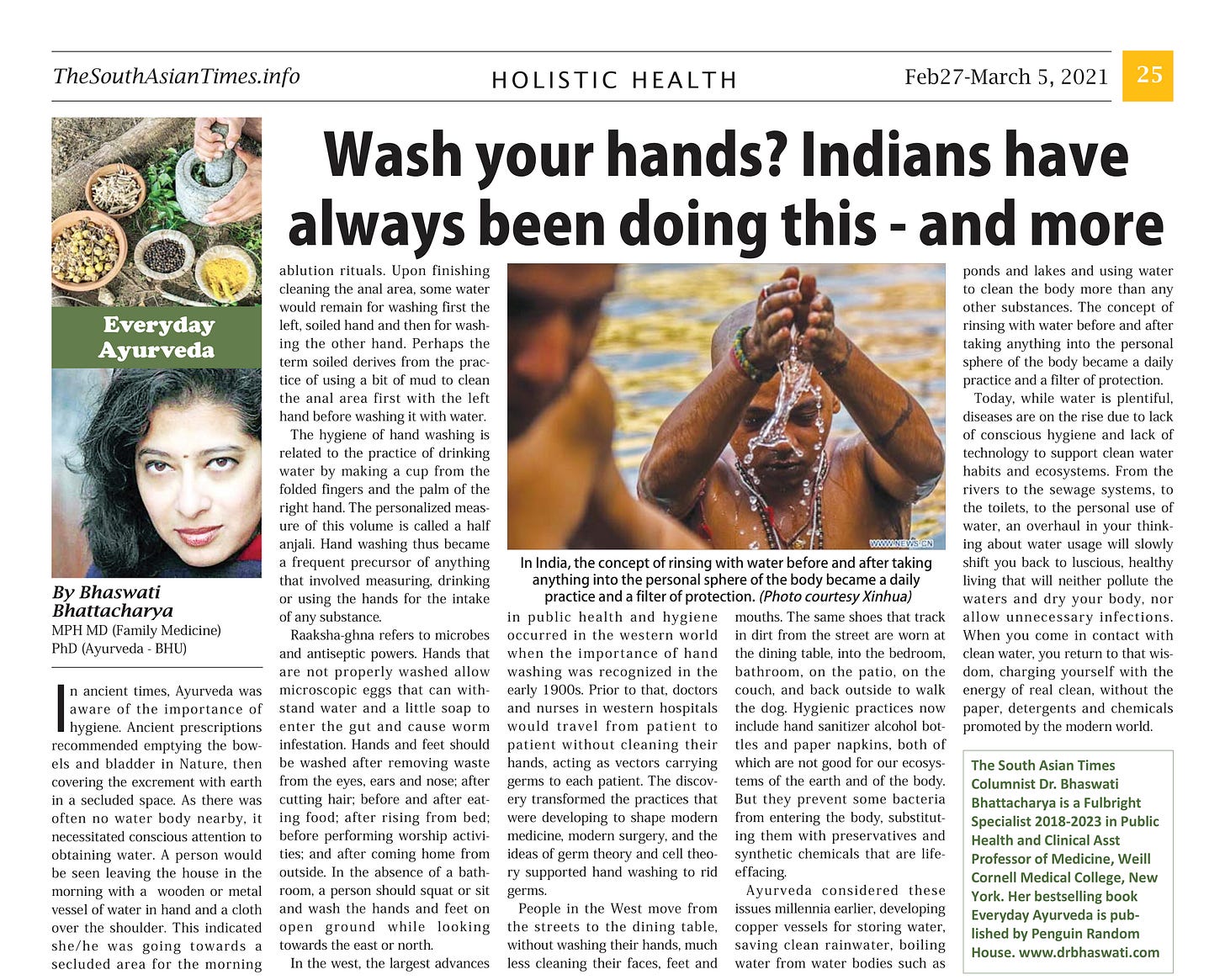Have you washed your hands?
In India, the concept of rinsing with water before and after taking anything into the personal sphere of the body became a daily practice and a filter of protection.
Washed Your Hands?
In ancient times, Ayurveda was aware of the importance of hygiene. Ancient prescriptions recommended emptying the bowels and bladder in Nature, then covering the excrement with earth in a secluded space. As there was often no water body nearby, it necessitated conscious attention to obtaining water. A person would be seen leaving the house in the morning with a wooden or metal vessel of water in hand and a cloth over the shoulder. This indicated she/he was going towards a secluded area for the morning ablution rituals. Upon finishing cleaning the anal area, some water would remain for washing first the left, soiled hand and then for washing the other hand. Perhaps the term soiled derives from the practice of using a bit of mud to clean the anal area first with the left hand before washing it with water.
The hygiene of hand washing is related to the practice of drinking water by making a cup from the folded fingers and the palm of the right hand. The personalized measure of this volume is called a half anjali. Hand washing thus became a frequent precursor of anything that involved measuring, drinking or using the hands for the intake of any substance.
Raaksha-ghna refers to microbes and antiseptic powers. Hands that are not properly washed allow microscopic eggs that can withstand water and a little soap to enter the gut and cause worm infestation. Hands and feet should be washed after removing waste from the eyes, ears and nose; after cutting hair; before and after eating food; after rising from bed; before performing worship activities; and after coming home from outside. In the absence of a bathroom, a person should squat or sit and wash the hands and feet on open ground while looking towards the east or north.
In the west, the largest advances in public health and hygiene occurred in the western world when the importance of hand washing was recognized in the early 1900s. Prior to that, doctors and nurses in western hospitals would travel from patient to patient without cleaning their hands, acting as vectors carrying germs to each patient. The discovery transformed the practices that were developing to shape modern medicine, modern surgery, and the ideas of germ theory and cell theory supported hand washing to rid germs.
People in the West move from the streets to the dining table, without washing their hands, much less cleaning their faces, feet and mouths. The same shoes that track in dirt from the street are worn at the dining table, into the bedroom, bathroom, on the patio, on the couch, and back outside to walk the dog. Hygienic practices now include hand sanitizer alcohol bottles and paper napkins, both of which are not good for our ecosystems of the earth and of the body. But they prevent some bacteria from entering the body, substituting them with preservatives and synthetic chemicals that are life-effacing.
Ayurveda considered these issues millennia earlier, developing copper vessels for storing water, saving clean rain water, boiling water from water bodies such as ponds and lakes and using water to clean the body more than any other substances. The concept of rinsing with water before and after taking anything into the personal sphere of the body became a daily practice and a filter of protection.
Today, while water is plentiful, diseases are on the rise due to lack of conscious hygiene and lack of technology to support clean water habits and ecosystems. From the rivers, to the sewage systems, to the toilets, to the personal use of water, an overhaul in your thinking about water usage will slowly shift you back to luscious, healthy living that will neither pollute the waters and dry your body, nor allow unnecessary infections. When you come in contact with clean water, you return to that wisdom, charging yourself with the energy of real clean, without the paper, detergents and chemicals promoted by the modern world.
week48. TheSouthAsianTimes
Download the .pdf version of this column by clicking on the image.
Dr. Bhaswati Bhattacharya is a Fulbright Specialist 2018‐2023 in Public Health. She serves as Clinical Asst Professor of Family Medicine in the Department of Medicine at Weill Cornell Medical College in New York, NY. Her bestselling book Everyday Ayurveda is published by Penguin Random House. To order an autographed copy, write to bhaswati@post.harvard.edu.
www.drbhaswati.com





